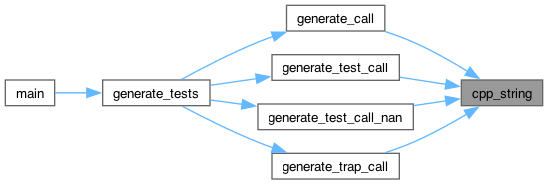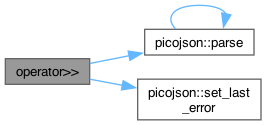#include <fstream>#include <iostream>#include <map>#include <set>#include <sstream>#include <string>#include <vector>#include <algorithm>#include <cstddef>#include <cstdio>#include <cstdlib>#include <cstring>#include <iterator>#include <limits>#include <stdexcept>#include <utility>#include <math.h>#include <locale.h>
Go to the source code of this file.
Classes | |
| struct | picojson::null |
| class | picojson::value |
| union | picojson::value::_storage |
| struct | picojson::serialize_str_char< Iter > |
| class | picojson::input< Iter > |
| class | picojson::deny_parse_context |
| class | picojson::default_parse_context |
| class | picojson::null_parse_context |
| struct | picojson::null_parse_context::dummy_str |
| struct | picojson::last_error_t< T > |
Namespaces | |
| namespace | picojson |
| namespace | std |
Macros | |
| #define | picojson_h |
| #define | PICOJSON_USE_RVALUE_REFERENCE 0 |
| #define | PICOJSON_NOEXCEPT throw() |
| #define | PICOJSON_USE_LOCALE 1 |
| #define | PICOJSON_ASSERT(e) |
| #define | SNPRINTF snprintf |
| #define | INIT(p, v) |
| #define | DEINIT(p) |
| #define | INIT(p, v) |
| #define | IS(ctype, jtype) |
| #define | GET(ctype, var) |
| #define | SET(ctype, jtype, setter) |
| #define | MAP(val, sym) |
| #define | MAP(sym, val) |
| #define | IS(ch, text, op) |
| #define | PICOJSON_CMP(type) |
Typedefs | |
| typedef value::array | picojson::array |
| typedef value::object | picojson::object |
Enumerations | |
| enum | { picojson::null_type , picojson::boolean_type , picojson::number_type , picojson::string_type , picojson::array_type , picojson::object_type } |
| enum | { picojson::INDENT_WIDTH = 2 } |
Functions | |
| template<typename Iter > | |
| void | picojson::copy (const std::string &s, Iter oi) |
| template<typename Iter > | |
| void | picojson::serialize_str (const std::string &s, Iter oi) |
| template<typename Iter > | |
| int | picojson::_parse_quadhex (input< Iter > &in) |
| template<typename String , typename Iter > | |
| bool | picojson::_parse_codepoint (String &out, input< Iter > &in) |
| template<typename String , typename Iter > | |
| bool | picojson::_parse_string (String &out, input< Iter > &in) |
| template<typename Context , typename Iter > | |
| bool | picojson::_parse_array (Context &ctx, input< Iter > &in) |
| template<typename Context , typename Iter > | |
| bool | picojson::_parse_object (Context &ctx, input< Iter > &in) |
| template<typename Iter > | |
| std::string | picojson::_parse_number (input< Iter > &in) |
| template<typename Context , typename Iter > | |
| bool | picojson::_parse (Context &ctx, input< Iter > &in) |
| template<typename Iter > | |
| std::string | picojson::parse (value &out, Iter &pos, const Iter &last) |
| template<typename Context , typename Iter > | |
| Iter | picojson::_parse (Context &ctx, const Iter &first, const Iter &last, std::string *err) |
| template<typename Iter > | |
| Iter | picojson::parse (value &out, const Iter &first, const Iter &last, std::string *err) |
| std::string | picojson::parse (value &out, const std::string &s) |
| std::string | picojson::parse (value &out, std::istream &is) |
| void | picojson::set_last_error (const std::string &s) |
| const std::string & | picojson::get_last_error () |
| bool | picojson::operator== (const value &x, const value &y) |
| bool | picojson::operator!= (const value &x, const value &y) |
| template<> | |
| void | std::swap (picojson::value &x, picojson::value &y) |
| std::istream & | operator>> (std::istream &is, picojson::value &x) |
| std::ostream & | operator<< (std::ostream &os, const picojson::value &x) |
| std::string | cpp_string (const picojson::value &x) |
| string | generate_test_call (picojson::object obj, string expected_t, string expected_v) |
| string | generate_test_call_nan (picojson::object obj) |
| string | generate_trap_call (picojson::object obj) |
| string | generate_call (picojson::object obj) |
| void | generate_tests (const map< string, vector< picojson::object > > &mappings) |
| void | usage (const char *name) |
| int | main (int argc, char **argv) |
Variables | |
| const string | test_includes |
| const string | test_preamble_0 = "using backend_t = backend<standalone_function_t, TestType>;\n auto code = read_wasm( " |
| const string | test_preamble_1 = "backend_t bkend( code, &wa );" |
| const std::set< std::string > | blacklist |
Macro Definition Documentation
◆ DEINIT
| #define DEINIT | ( | p | ) |
◆ GET
| #define GET | ( | ctype, | |
| var ) |
Definition at line 351 of file spec_test_generator.cpp.
◆ INIT [1/2]
◆ INIT [2/2]
◆ IS [1/2]
| #define IS | ( | ch, | |
| text, | |||
| op ) |
Definition at line 328 of file spec_test_generator.cpp.
◆ IS [2/2]
| #define IS | ( | ctype, | |
| jtype ) |
Definition at line 328 of file spec_test_generator.cpp.
◆ MAP [1/2]
| #define MAP | ( | sym, | |
| val ) |
◆ MAP [2/2]
| #define MAP | ( | val, | |
| sym ) |
◆ PICOJSON_ASSERT
| #define PICOJSON_ASSERT | ( | e | ) |
Definition at line 104 of file spec_test_generator.cpp.
◆ PICOJSON_CMP
| #define PICOJSON_CMP | ( | type | ) |
◆ picojson_h
| #define picojson_h |
Definition at line 38 of file spec_test_generator.cpp.
◆ PICOJSON_NOEXCEPT
| #define PICOJSON_NOEXCEPT throw() |
Definition at line 82 of file spec_test_generator.cpp.
◆ PICOJSON_USE_LOCALE
| #define PICOJSON_USE_LOCALE 1 |
Definition at line 95 of file spec_test_generator.cpp.
◆ PICOJSON_USE_RVALUE_REFERENCE
| #define PICOJSON_USE_RVALUE_REFERENCE 0 |
Definition at line 74 of file spec_test_generator.cpp.
◆ SET
| #define SET | ( | ctype, | |
| jtype, | |||
| setter ) |
Definition at line 376 of file spec_test_generator.cpp.
◆ SNPRINTF
| #define SNPRINTF snprintf |
Definition at line 118 of file spec_test_generator.cpp.
Function Documentation
◆ cpp_string()
| std::string cpp_string | ( | const picojson::value & | x | ) |
Definition at line 1131 of file spec_test_generator.cpp.


◆ generate_call()
| string generate_call | ( | picojson::object | obj | ) |
Definition at line 1250 of file spec_test_generator.cpp.


◆ generate_test_call()
| string generate_test_call | ( | picojson::object | obj, |
| string | expected_t, | ||
| string | expected_v ) |
Definition at line 1157 of file spec_test_generator.cpp.


◆ generate_test_call_nan()
| string generate_test_call_nan | ( | picojson::object | obj | ) |
Definition at line 1205 of file spec_test_generator.cpp.


◆ generate_tests()
| void generate_tests | ( | const map< string, vector< picojson::object > > & | mappings | ) |
Definition at line 1285 of file spec_test_generator.cpp.


◆ generate_trap_call()
| string generate_trap_call | ( | picojson::object | obj | ) |
Definition at line 1228 of file spec_test_generator.cpp.


◆ main()
| int main | ( | int | argc, |
| char ** | argv ) |
Definition at line 1350 of file spec_test_generator.cpp.

◆ operator<<()
|
inline |
Definition at line 1110 of file spec_test_generator.cpp.

◆ operator>>()
|
inline |
Definition at line 1100 of file spec_test_generator.cpp.

◆ usage()
| void usage | ( | const char * | name | ) |
Definition at line 1344 of file spec_test_generator.cpp.

Variable Documentation
◆ blacklist
| const std::set<std::string> blacklist |
Definition at line 1273 of file spec_test_generator.cpp.
◆ test_includes
| const string test_includes |
Definition at line 1122 of file spec_test_generator.cpp.
◆ test_preamble_0
| const string test_preamble_0 = "using backend_t = backend<standalone_function_t, TestType>;\n auto code = read_wasm( " |
Definition at line 1128 of file spec_test_generator.cpp.
◆ test_preamble_1
Definition at line 1129 of file spec_test_generator.cpp.